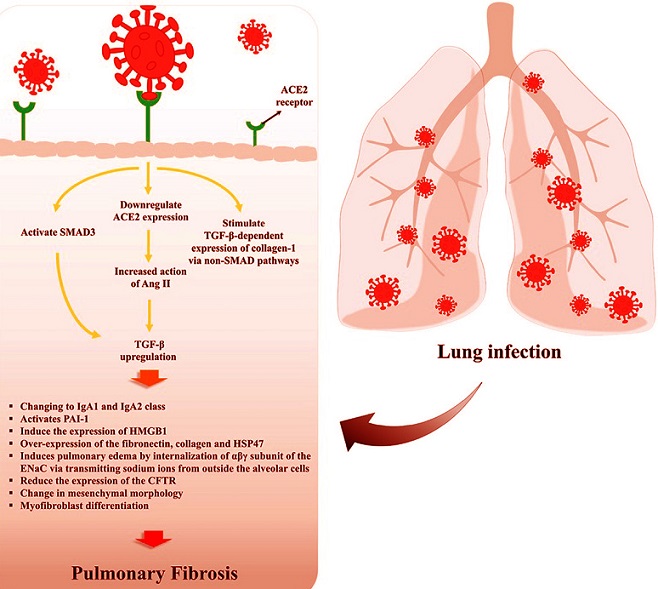Nikhil Prasad Fact checked by:Thailand Medical News Team Dec 22, 2024 3 months, 3 weeks, 6 days, 32 minutes ago
Medical News: The COVID-19 pandemic, caused by the novel Severe Acute Respiratory Syndrome Coronavirus 2 (SARS-CoV-2), has claimed the lives of millions globally since its emergence in late 2019. The virus, which spreads primarily through respiratory droplets, has overwhelmed healthcare systems and challenged researchers to unravel its complex pathology. Among the most severe cases, a hallmark feature is the unregulated immune response, often referred to as a “cytokine storm,” which exacerbates disease severity and increases mortality.
 Graphical Abstract - Transforming Growth Factor Beta and Its Role in COVID-19
Graphical Abstract - Transforming Growth Factor Beta and Its Role in COVID-19
This
Medical News report explores the role of Transforming Growth Factor Beta (TGF-β), a key signaling molecule involved in immune regulation and tissue repair, in the progression of COVID-19. Researchers from Zahedan University of Medical Sciences, Tehran University of Medical Sciences, and the University of Kashan in Iran have shed light on the intricate relationship between TGF-β signaling and the pathogenesis of COVID-19, offering new avenues for therapeutic interventions.
How SARS-CoV-2 Disrupts the Body
SARS-CoV-2 primarily targets the respiratory system by binding to angiotensin-converting enzyme 2 (ACE2) receptors on the surface of host cells. These receptors are abundant in various tissues, including the lungs and digestive tract. The viral spike protein facilitates entry into the host cell with the help of the TMPRSS2 enzyme, allowing the virus to hijack the cell’s machinery to replicate and spread.
Once inside, the virus triggers a cascade of immune responses. While an effective immune reaction can help control the infection, a dysregulated response leads to excessive release of pro-inflammatory cytokines, including interleukin-6 (IL-6) and tumor necrosis factor-alpha (TNF-α). This immune overactivation results in acute respiratory distress syndrome (ARDS), characterized by severe lung damage and reduced oxygen exchange. Emerging research has highlighted the role of TGF-β as a critical mediator in this process, influencing both immune response and tissue repair mechanisms.
TGF-β and COVID-19: Key Insights
TGF-β is a multifunctional cytokine involved in immune regulation, tissue repair, and fibrosis. It plays a dual role in COVID-19, acting as both a protective agent during early infection and a harmful mediator during advanced disease. During the initial stages, TGF-β helps modulate immune activity, preventing excessive inflammation. However, prolonged activation of the TGF-β pathway can lead to complications such as lung fibrosis, a condition marked by irreversible scarring of lung tissue.
One significant finding is the interplay between TGF-β and ACE2 expression. TGF-β can alter ACE2 levels, potentially influencing viral entry and the severity of infection. Additionally, high levels of TGF-β in severe COVID-19 cases are associated with increased lung inflammation and fibrosis, as the cytokine drives the differ
entiation of fibroblasts into myofibroblasts. These cells produce excessive collagen, leading to stiffened lung tissue and impaired respiratory function.
Potential Therapeutic Approaches Targeting TGF-β
Given its pivotal role in COVID-19 progression, the TGF-β pathway presents a promising target for therapeutic intervention. Several pharmacological agents, including nintedanib and pirfenidone, have shown potential in modulating this pathway. These drugs, primarily used to treat pulmonary fibrosis, work by inhibiting TGF-β signaling and reducing fibrotic activity.
Clinical trials are also investigating innovative approaches, such as mesenchymal stem cell (MSC) therapy. MSCs have demonstrated the ability to reduce TGF-β levels and promote lung healing in COVID-19 patients. In a recent study, patients treated with umbilical cord-derived MSCs showed improved respiratory function and reduced inflammatory markers compared to those receiving standard care.
Other emerging therapies include low-dose radiation, which may suppress TGF-β activation, and artemisinin derivatives, which have shown anti-inflammatory properties. These treatments are in various stages of research, highlighting the ongoing efforts to harness TGF-β modulation for better COVID-19 outcomes.
Broader Implications of TGF-β Dysregulation
Beyond acute infection, TGF-β plays a role in long COVID, a condition characterized by persistent symptoms such as fatigue, breathlessness, and brain fog. Prolonged activation of the TGF-β pathway may contribute to chronic inflammation and tissue damage, underscoring the need for long-term strategies to address its effects.
TGF-β is also implicated in the epithelial-to-mesenchymal transition (EMT), a process that converts epithelial cells into fibroblast-like cells. This transition is linked to lung fibrosis and other complications, further emphasizing the importance of targeted therapies to mitigate its impact.
Conclusions and Future Directions
The TGF-β signaling pathway is a critical player in the pathophysiology of COVID-19, influencing both immune responses and tissue repair mechanisms. While early activation of TGF-β may offer protective benefits, prolonged dysregulation can exacerbate disease severity, leading to complications such as lung fibrosis and long COVID.
Future research should focus on the context-dependent effects of TGF-β, aiming to develop therapies that balance its beneficial and harmful roles. Advances in molecular biology have enabled the development of targeted therapies, including inhibitors, neutralizing antibodies, and ligand traps, which hold promise for managing TGF-β-related complications. By refining these approaches and conducting rigorous clinical trials, researchers can pave the way for more effective treatments that address both acute and long-term consequences of COVID-19.
The study findings were published in the peer-reviewed journal: Microbial Pathogenesis.
https://www.sciencedirect.com/science/article/abs/pii/S0882401024007034
For the latest COVID-19 News, keep on logging to Thailand
Medical News.
Read Also:
https://www.thailandmedical.news/news/targeting-tgf-beta-pathway-shows-promise-for-head-and-neck-cancer
https://www.thailandmedical.news/news/medical-news-ohio-state-university-discovers-that-rebalancing-tgf%CE%B21-bmp-signals-reverse-t-cell-dysfunctionality-during-viral-infections-and-cancer-
https://www.thailandmedical.news/news/covid-19-diagnostics-study-indicates-that-acetylated-k676-tgfbip-can-be-used-as-a-severity-diagnostic-blood-biomarker-for-sars-cov-2-pneumonia
